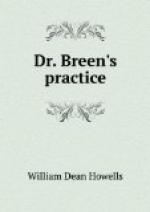After they were gone, a queer, gaunt man came and glanced from the doorway at her. He had one eye in unnatural fixity, and the other set at that abnormal slant which is said to qualify the owner for looking round a corner before he gets to it. A droll twist of his mouth seemed partly physical, but: there is no doubt that he had often a humorous intention. It was Barlow, the man-of-all-work, who killed and plucked the poultry, peeled the potatoes and picked the peas, pulled the sweet-corn and the tomatoes, kindled the kitchen fire, harnessed the old splayfooted mare, —safe for ladies and children, and intolerable for all others, which formed the entire stud of the Jocelyn House stables,—dug the clams, rowed and sailed the boat, looked after the bath-houses, and came in contact with the guests at so many points that he was on easy terms with them all. This ease tended to an intimacy which he was himself powerless to repress, and which, from time to time, required their intervention. He now wore a simple costume of shirt and trousers, the latter terminated by a pair of broken shoes, and sustained by what he called a single gallows; his broad-brimmed straw hat scooped down upon his shoulders behind, and in front added to his congenital difficulty of getting people in focus. “How do you do, this morning, Mrs. Maynard?” he said.
“Oh, I’m first-rate, Mr. Barlow. What sort of day do you think it’s going to be for a sail?”
Barlow came out to the edge of the piazza, and looked at the sea and sky. “First-rate. Fog’s most burnt away now. You don’t often see a fog at Jocelyn’s after ten o’clock in the mornin’.”
He looked for approval to Mrs. Maynard, who said, “That’s so. The air’s just splendid. It ’s doing everything for me.”
“It’s these pine woods, back o’ here. Every breath on ’em does ye good. It’s the balsam in it. D’ you ever try,” he asked, stretching his hand as far up the piazza-post as he could, and swinging into a conversational posture,—“d’ you ever try whiskey—good odd Bourbon whiskey—with white-pine chips in it?”
Mrs. Maynard looked up with interest, but, shaking her head, coughed for no.
“Well, I should like to have you try that.”
“What does it do?” she gasped, when she could get her breath.
“Well, it’s soothin’ t’ the cough, and it builds ye up, every ways. Why, my brother,” continued the factotum, “he died of consumption when I was a boy,—reg’lar old New England consumption. Don’t hardly ever hear of it any more, round here. Well, I don’t suppose there’s been a case of reg’lar old New England consumption—well, not the old New England kind —since these woods growed up. He used to take whiskey with white-pine chips in it; and I can remember hearin ’em say that it done him more good than all the doctor’s stuff. He’d been out to Demarary, and everywheres, and he come home in the last stages, and took up with this whiskey with whitepine chips in it. Well, it’s just like this, I presume it’s the balsam in the chips. It don’t make any difference how you git the balsam into your system, so ’s ’t you git it there. I should like to have you try whiskey with white-pine chips in it.”




